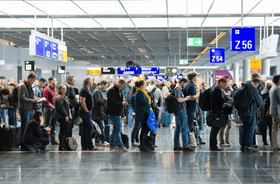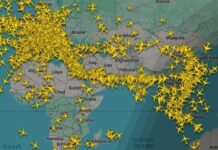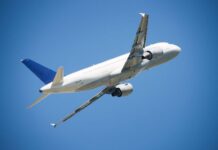
A proposed new U.S. Department of Transportation rule could raise ticket prices and create unrealistic passenger expectations.
The International Air Transport Association (IATA) was none too pleased with a proposed rule recently issued by the U.S. Department of Transportation (DOT) and the Biden Administration that would require airlines to provide financial compensation to travelers inconvenienced by flight delays and cancellations. “When an airline causes a flight cancellation or delay, passengers should not foot the bill,” said U.S. Transportation Secretary Pete Buttigieg when announcing the new rule on May 8. “This rule would, for the first time in U.S. history, propose to require airlines to compensate passengers and cover expenses such as meals, hotels and rebooking in cases where the airline has caused a cancellation or significant delay.”
But that’s not how it would actually play out, IATA says. The rule, scheduled to be issued as final later this year, would just add a layer of expense without doing anything to fix the flight delay and cancellation issues airlines are struggling with lately, according to the association. This is because, according to the DOT’s Cancellation and Delay Scoreboard, U.S. airlines have already responded to DOT customer service improvement demands over the past two years, according to the DOT. While none of the 10 largest U.S. carriers previously guaranteed meals or hotel accommodations for delays and cancellations caused by the airline, a letter last summer urging them to get on board with improved customer service already has spurred them into action. Now all 10 provide meals or cash vouchers to passengers who find themselves delayed for an extended period due to circumstances controlled by the airlines. Nine of these airlines also offer passengers who experienced an overnight cancellation complimentary hotel accommodation.
“Airlines work hard to get their passengers to their destinations on time and do their best to minimize the impacts of any delays. Airlines already have financial incentives to get their passengers to their destination as planned. Managing delays and cancellations is very costly for airlines. And passengers can take their loyalty to other carriers if they are not satisfied with service levels. The added layer of expense that this regulation will impose will not create a new incentive, but it will have to be recouped — which is likely to have an impact on ticket prices,” explains Willie Walsh, IATA’s Director General.
“There’s no question if there’s another layer of government regulation and cost that’s introduced into the system, it will eventually find its way back into ticket prices,” agreed Delta Air Lines CEO Ed Bastian during an interview on CBS Mornings May 17. “That’s just common business logic.”
And it could raise unrealistic expectations to boot, IATA said. The DOT was careful to note that airlines would only have to compensate passengers for delays and cancellations the airlines themselves are responsible for. Because most flight delays and cancellations are caused by weather, those wouldn’t be covered by the new rule. Weather-related delays and cancellations also can continue to have an effect on flights days and weeks after the actual weather event, making it difficult to figure out where the weather effect ends and airline responsibility begins. Also not covered would be the air traffic controller shortages that bogged down U.S. flights last year, as well as runway closures and equipment failures. Even aviation-related supply chain issues can cause delays and parts shortages that affect airline reliability but are for the most part outside of the airline’s control, IATA claims.
As part of the announcement of the proposed rule, the DOT also said it has launched FlightRights.Gov and expanded its Airline Customer Service Dashboard to give travelers more transparency about the what, if any, compensation airlines currently guarantee when they are the cause of a cancelation or delay.
You May Also Be Interested In…
Airports and Airlines Most Likely to Lose or Damage Your Luggage
10 Worst U.S. Airports for Flight Cancellations and Delays



![[UPDATE] Qatar Reopens Airspace After Iran Target on U.S. Military Base](https://www.prevuemeetings.com/wp-content/uploads/2025/06/close-up-detail-view-of-highloader-cargo-catering-2025-01-10-12-57-42-utc-1-218x150.jpg)






